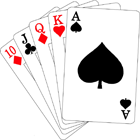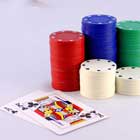我每天玩的时候都会找大概有两个玩得不错的玩家的赌桌,有一个或两个狂热者和五六名玩家是想方设法赢钱,但似乎又无法得到它的诀窍。如果你是这些玩家之一,那么也许就是最近才开始玩扑克牌,或只是想知道这个游戏有什么赚钱的把戏。然后我想分享一些提示和指南。我的建议是基于我自己的经验,并且是针对在线游戏。虽然我不教你如何玩扑克牌,但是我想介绍一下我自己关于微限制玩法的观点,以及为什么它是一个未来盈利的金矿,
这一切开始于您的资金。有关于赌资管理和如何最好地建立赌资的文章,所以我就不研究那些。尽管我想告诉你的关于资金的一些东西在这些文章里是没有的。
虽然我想也提及一般的扑克方面的阅读书籍和文章的重要性,特别是您所选择的扑克游戏(德州扑克,梭哈,奥马哈扑克等)。相反我想介绍经验的无限重要性。
资金
如果你想通过扑克游戏赚钱,你可能要做的是,开始考虑自己一个人的扑克公司,把自己当作投资者。我们的想法是,给你的公司一笔钱,然后您的公司试图增加自身的价值,赢得扑克。如果你成功了,你的公司将达到它的收入足以给其唯一股东以小的回报。
自己应该投资多少?这是真的给你。这篇文章的目标观众,但是,我会建议你不要让它超过100美元,但至少50美元。我知道有很多人会不同意,当我主张限制了你的第一个投资到100美元,因为如果你能负担得起,你总是有更好的资金。并且我同意。但是我不赞成以下。
你想限制这第一笔投资的原因(你成为一个成功的扑克商人的第一个步骤)是,我希望你玩微限制。我想你打那些0.05 美元/ 0.10美元限量桌。如果您还不是非常成功,玩这一点的时候,它是重要的,确保限制你的损失,因为我要你用这笔钱打尽可能多手牌。我想这一点非常清楚:你50元的目标是增长不了名利和财富的,重要的是玩游戏中获得的经验。对于所有意图和目的,你可以认为它是极限扑克速成班的学费。如果你能提高你的资金,同时用功打出你需要玩的数以千计手牌,这非常了不起!如果没有,那么,你只减少您所支付的费用到你可以赚钱的点位。
我希望你输掉了这些50美元,但如果你真的坚持最低限度,你可以发现,你相当长一段时间在这样做。不用担心,因为这一切都按计划进行。
做计划
作为一个企业的老板,你当然有义务为你的公司做出战略计划提供给你的投资者。好吧,也许我会一点点丢弃无聊的图表类比,但我想强调有计划的重要性。因为有一个计划,让你在艰难的时候能够坚持下去。
你可以制定你的计划,但是你想把任何你所希望的规则放进去。随着时间的推移,你可以修改它,但不轻易改变计划。请记住,你开始想有一个计划的原因是你不会做蠢事,你不“允许”坐在桌上是你资金以外的方式,因为你正在试图快速赚钱来弥补你持续的损失。有一个很好的规则添加到你的规则。
做一个计划,计划涵盖了以上你赢钱的情况。什么是你的行动的过程中,如果您的资金减半会怎样?你可以限制吗?你有更多的钱使自己重新拥有资金吗?
当你做计划时严格要求自己。如果你成功,也要有支付的计划。在低限玩法中,也许你觉得没有什么可以做,任何收费,也许你赢得了20美元,也许你觉得为自己买不了什么东西,但为自己购买一本扑克书如何呢?严格来说,你投资的钱赚了去为未来赢钱更多的奖金。现在,我们正说到了主题上…
译文:
Every day that I play, I find tables that have about two decent-to-good players, one or two maniacs, and then five or six players who seemingly tries to play to win money, but just can't seem to get the knack of it. If you're one of these players, perhaps recently started playing poker, or just want to know what the trick to making money off of this game is, then I have a few tips and pointers I want to share. My advice is based on my own experience, and is aimed at online play. I'm not out to teach you how to play poker, though, but I want to introduce my own perspective on micro limit play, and why it's a gold mine for future earnings.
The place it all starts is with your bankroll. There are lots of articles on bankroll management, and how to best build it , so I won't go into that. I want to tell you some things about your bankroll that aren't necessarily covered in these articles, though.
I want to also cover the importance of reading books and articles on poker in general, and your choice of poker game (hold'em, stud, omaha poker, etc) specifically. I want to contrast this to the almost infinite importance of experience.
Bankroll
If you want to make money off of poker, which you probably do, you may want to start considering yourself a one-man-poker-corporation, with yourself as the investor. The idea is that you give your company a sum of money, and your company then tries to increase its own worth by winning at poker. If you're successful, your company will reach a point where its income is great enough to give a little something back to its only shareholder.
How much should you invest in yourself? That's really up to you. For the target audience of this post, however, I'll suggest that you don't make it more than $100, but try to scrape up at least $50. I know there are plenty of people who will disagree with me when I advocate limiting your first investment to $100, because if you can afford it, you're always better off with a better bankroll. And I agree. But I disagree.
The reason you want to limit this first investment - your first step in becoming a successful poker businessman or woman - is that I want you to play micro limits. I want you to hit those $0.05/$0.10 limit tables. If you haven't been very successful up to this point when playing, then it's important to make sure that you limit your losses, because I want you to play as many hands as possible with this money. I want to make this point very clearly: Your objective with the $50 is not to grow it into fame and fortune, it's to gain experience in playing the game. For all intents and purposes, you may think of it as a fee for a crash course in limit poker. If you manage to increase your bankroll while grinding out the thousands of hands that you need to play, great! If not, well, you're only down the fee you paid to get to the point where you can make money.
I expect you to lose these $50, but if you really do stick with the lowest limits you can find, it will take you quite a while to do so. Not to worry, though, because it's all according to plan. Ah, yes, the plan.
Make the plan
As a business owner, you're of course obligated to make a strategic plan for your company that you can present to your investor. Okay, maybe I'm going a little off the chart with the silly analogies here, but I want to stress the importance of having a plan, because having a plan makes you able to stick to something when times get tough.
You may formulate your plan however you want, and put any rules you so wish into it. You may modify it as time goes by, but don't take a change-of-plan lightly. Remember that the reason you want a plan to begin with is so you don't do something foolish that you're not "allowed" to do, like sitting down at a table that's way out of your bankroll's league, because you're looking for fast money to cover up the losses you just sustained. There's a good rule to add to your ruleset, right there.
Make a plan that covers more than just the scenario of you winning money. What's your course of action if your bankroll halves? Can you move down in limits? Do you have more money that you're able to re-stock your bankroll with?
Be strict with yourself when you make the plan. But also make plans for pay-outs, if you're successful. At the low limits, maybe you feel that there isn't much you can do with any pay-out, maybe the $20 that you've earned can't buy you anything that you couldn't afford already, but how about buying a book on poker for yourself? Strictly speaking, you're investing the money you've earned, to make larger future winnings. Now, as we're on the topic…



 在线牛牛怎么玩才能赢
在线牛牛怎么玩才能赢 德州扑克游戏玩法中玩
德州扑克游戏玩法中玩 乐玩网上现金炸金花的
乐玩网上现金炸金花的 玩转网上二十一点游戏
玩转网上二十一点游戏


